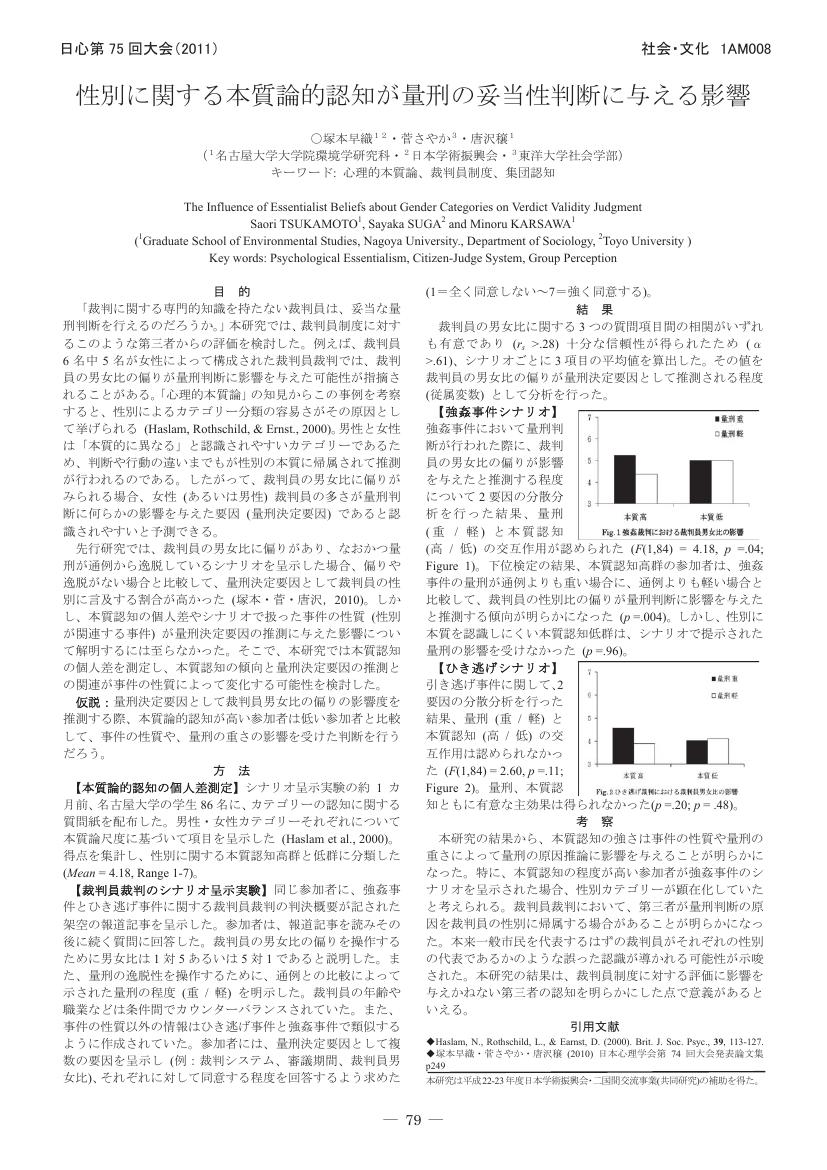- 著者
- 塚本 早織
- 出版者
- 日本社会心理学会
- 雑誌
- 社会心理学研究 (ISSN:09161503)
- 巻号頁・発行日
- vol.38, no.1, pp.17, 2022-07-31 (Released:2022-07-31)
5 0 0 0 OA 個人差から集団差への一般化における心理的本質主義の役割
- 著者
- 塚本 早織 唐沢 穣
- 出版者
- 人間環境学研究会
- 雑誌
- 人間環境学研究 (ISSN:13485253)
- 巻号頁・発行日
- vol.13, no.1, pp.13-20, 2015 (Released:2015-06-30)
- 被引用文献数
- 1 1
自分とは反対の性格特性を持つ他者が,異なる民族の一員であった場合,人はその性格の違いを民族性が原因であるかのように解釈する場合がある。日常生活においてみられるこのような過度な一般化は、民族に関する偏ったステレオタイプを形成する一因となる。本研究は、個人の特徴に関する知識が、カテゴリーに関する知識へと一般化される状況と、それに影響を与える個人差要因に着目した実証的研究を行った。個人差要因として、心理的本質主義信念を測定し、民族カテゴリーに行動や認知の原因となる本質的因子の存在を錯覚しやすい人ほど、他民族他者と自身の違いを民族性の違いとして一般化する傾向が強いと予測した。実験参加者は全て日本人学生であったが、実験参加のパートナーという名目で「留学生」(実験1ではインドネシア国籍、実験2では中国国籍)あるいは「日本人」の実験協力者と同時に実験に参加した。実験では、参加者および実験協力者に対して認知傾向を調べるテストを行い、テスト後に偽のフィードバックを与えた。フィードバックとして、パートナー間にみられる認知傾向の類似性(同じ・異なる)を操作した。その結果、パートナー間の類似性に関する情報を日本人および留学生全般に一般化する程度は、パートナーの国籍とフィードバックの類似性の組み合わせによって異なることが明らかとなった。具体的には、留学生パートナーとの間に認知傾向の違いが告げられた参加者において、その違いを日本人および留学生カテゴリーに一般化し、民族間の差異を過度に推測する傾向がみられた。同様の一般化傾向は、日本人パートナーと同じ認知傾向があると告げられた参加者にもみられた。しかし、留学生との違いを民族間の差異に一般化した前者の場合のみ、その程度が心理的本質主義信念の強さと関連していることが明らかになった。本研究により、異なる民族他者との交流で得られる些細な情報からも、民族に関するステレオタイプが形成される可能性が示唆され、それには民族カテゴリーに関する信念の個人差が影響を与えることが明らかとなった。
3 0 0 0 OA 日本版HEMA尺度の作成と検討──幸せへの動機づけとは──
- 著者
- 浅野 良輔 五十嵐 祐 塚本 早織
- 出版者
- 公益社団法人 日本心理学会
- 雑誌
- 心理学研究 (ISSN:00215236)
- 巻号頁・発行日
- vol.85, no.1, pp.69-79, 2014-04-25 (Released:2014-04-15)
- 参考文献数
- 41
- 被引用文献数
- 3 16
Hedonia (seeking pleasure and relaxation) and eudaimonia (seeking to improve oneself in congruence with one’s values) uniquely contribute to well-being. The authors developed and tested the construct validity of a Japanese version of the Hedonic and Eudaimonic Motives for Activities (HEMA) scale that had been originally developed in North America. Drawing on the theoretical and empirical evidence from research on emotion, we proposed that people would pursue well-being in three different directions: pleasure, relaxation, and eudaimonia. In Study 1, we used the original HEMA scale to examine the Japanese attainment of well-being. The results supported the hypothesized three-factor model. Study 2 revealed that the Japanese version of the HEMA scale measured pleasure, relaxation, and eudaimonia. Each of these subscales showed statistically sufficient internal consistency. There was no gender difference in any of these measures. Scores on the scale systematically corresponded with external criterion variables, such as life satisfaction, affect, Ryff’s psychological well-being, social support, and lifestyle. Implications for psychological research and public policies that cover the topic of the pursuit of well-being are discussed.
2 0 0 0 OA 性別に関する本質論的認知が量刑の妥当性判断に与える影響
- 著者
- 塚本 早織 菅 さやか 唐沢 穣
- 出版者
- 公益社団法人 日本心理学会
- 雑誌
- 日本心理学会大会発表論文集 日本心理学会第75回大会 (ISSN:24337609)
- 巻号頁・発行日
- pp.1AM008, 2011-09-15 (Released:2019-02-02)
2 0 0 0 OA 日本語版幸せへの恐れ尺度と日本語版幸せの壊れやすさ尺度の信頼性・妥当性の検討
- 著者
- 生田目 光 猪原 あゆみ 浅野 良輔 五十嵐 祐 塚本 早織 沢宮 容子
- 出版者
- 公益社団法人 日本心理学会
- 雑誌
- 心理学研究 (ISSN:00215236)
- 巻号頁・発行日
- vol.92, no.1, pp.31-39, 2021 (Released:2021-04-25)
- 参考文献数
- 41
- 被引用文献数
- 1
This study investigated the reliability and validity of the Japanese versions of the Fear of Happiness Scale and the Fragility of Happiness Scale. The scales were administered to 341 Japanese undergraduates. Confirmatory factor analysis showed that, like the original versions, the Japanese Fear of Happiness Scale and the Fragility of Happiness Scale each had a one-factor structure. The two scales also each had good internal consistency, test-retest reliability, and construct validity. Furthermore, the scales showed incremental validity by predicting psychological elements (life satisfaction, depression, anxiety, stress) better than the behavioral inhibition system (BIS) and the behavioral activation system (BAS). The results of the present study revealed that the Fear of Happiness Scale and the Fragility of Happiness Scale had an adequate reliability and validity in this Japanese group.
1 0 0 0 OA 日本語版幸せへの恐れ尺度と日本語版幸せの壊れやすさ尺度の信頼性・妥当性の検討
- 著者
- 生田目 光 猪原 あゆみ 浅野 良輔 五十嵐 祐 塚本 早織 沢宮 容子
- 出版者
- 公益社団法人 日本心理学会
- 雑誌
- 心理学研究 (ISSN:00215236)
- 巻号頁・発行日
- pp.92.20206, (Released:2021-01-31)
- 参考文献数
- 41
- 被引用文献数
- 1
This study investigated the reliability and validity of the Japanese versions of the Fear of Happiness Scale and the Fragility of Happiness Scale. The scales were administered to 341 Japanese undergraduates. Confirmatory factor analysis showed that, like the original versions, the Japanese Fear of Happiness Scale and the Fragility of Happiness Scale each had a one-factor structure. The two scales also each had good internal consistency, test-retest reliability, and construct validity. Furthermore, the scales showed incremental validity by predicting psychological elements (life satisfaction, depression, anxiety, stress) better than the behavioral inhibition system (BIS) and the behavioral activation system (BAS). The results of the present study revealed that the Fear of Happiness Scale and the Fragility of Happiness Scale had an adequate reliability and validity in this Japanese group.
- 著者
- 塚本 早織 バレリー ゴンザレス 唐沢 穣
- 出版者
- Society for Human Environmental Studies
- 雑誌
- 人間環境学研究 (ISSN:13485253)
- 巻号頁・発行日
- vol.8, no.1, pp.25-31, 2010
- 被引用文献数
- 1
カナダでは、様々な人種的、文化的背景を持つ人々が共生しているにもかかわらず、「白人」以外の人々は「カナダ人」として知覚されにくい現象がみられ、差別や偏見の対象となる。本研究の目的は、人が持ちえる最も基本的な要素である「人種」「出身地」「居住地」が自身や他者を「カナダ人」であると判断する際に与える影響を検証することであった。108名のカナダ人大学生に、国民アイデンティティに関する質問紙に回答してもらった。まず、他者をカナダ人であると判断する際に「白人」要素の有無が基準になるという仮説を基に、外国生まれの白人と、カナダ生まれの非白人の、「私はカナダ人である」との主張に対する同意の程度を5件法で評定させた。その結果、参加者の「カナダ人」像に一致したのは、カナダ生まれの非白人であった。次に、同じ対象に関する「他の多くのカナダ人」の推測評定を求めたところ、非白人参加者の回答に、「白人」対象をよりカナダ人であると推測する傾向が見られた。また、参加者に自身の国民アイデンティティを規定する際に重要だと考える要素を順序付けさせた。その結果、非白人参加者は白人参加者に比べ、「人種」要素が自身の国民アイデンティティを定義する際に不可欠だと考える傾向が明らかになった。人種や民族性を理由とする差別や偏見の経験が、認知に影響を与えるという先行研究の知見と同様に、本研究においても参加者の人種によって自身や他者の国民アイデンティティ認知が異なることが明らかになった。
1 0 0 0 日本版HEMA尺度の作成と検討──幸せへの動機づけとは──
- 著者
- 浅野 良輔 五十嵐 祐 塚本 早織
- 出版者
- 公益社団法人 日本心理学会
- 雑誌
- 心理学研究 (ISSN:00215236)
- 巻号頁・発行日
- vol.85, no.1, pp.69-79, 2014
- 被引用文献数
- 16
Hedonia (seeking pleasure and relaxation) and eudaimonia (seeking to improve oneself in congruence with one's values) uniquely contribute to well-being. The authors developed and tested the construct validity of a Japanese version of the Hedonic and Eudaimonic Motives for Activities (HEMA) scale that had been originally developed in North America. Drawing on the theoretical and empirical evidence from research on emotion, we proposed that people would pursue well-being in three different directions: pleasure, relaxation, and eudaimonia. In Study 1, we used the original HEMA scale to examine the Japanese attainment of well-being. The results supported the hypothesized three-factor model. Study 2 revealed that the Japanese version of the HEMA scale measured pleasure, relaxation, and eudaimonia. Each of these subscales showed statistically sufficient internal consistency. There was no gender difference in any of these measures. Scores on the scale systematically corresponded with external criterion variables, such as life satisfaction, affect, Ryff's psychological well-being, social support, and lifestyle. Implications for psychological research and public policies that cover the topic of the pursuit of well-being are discussed.
